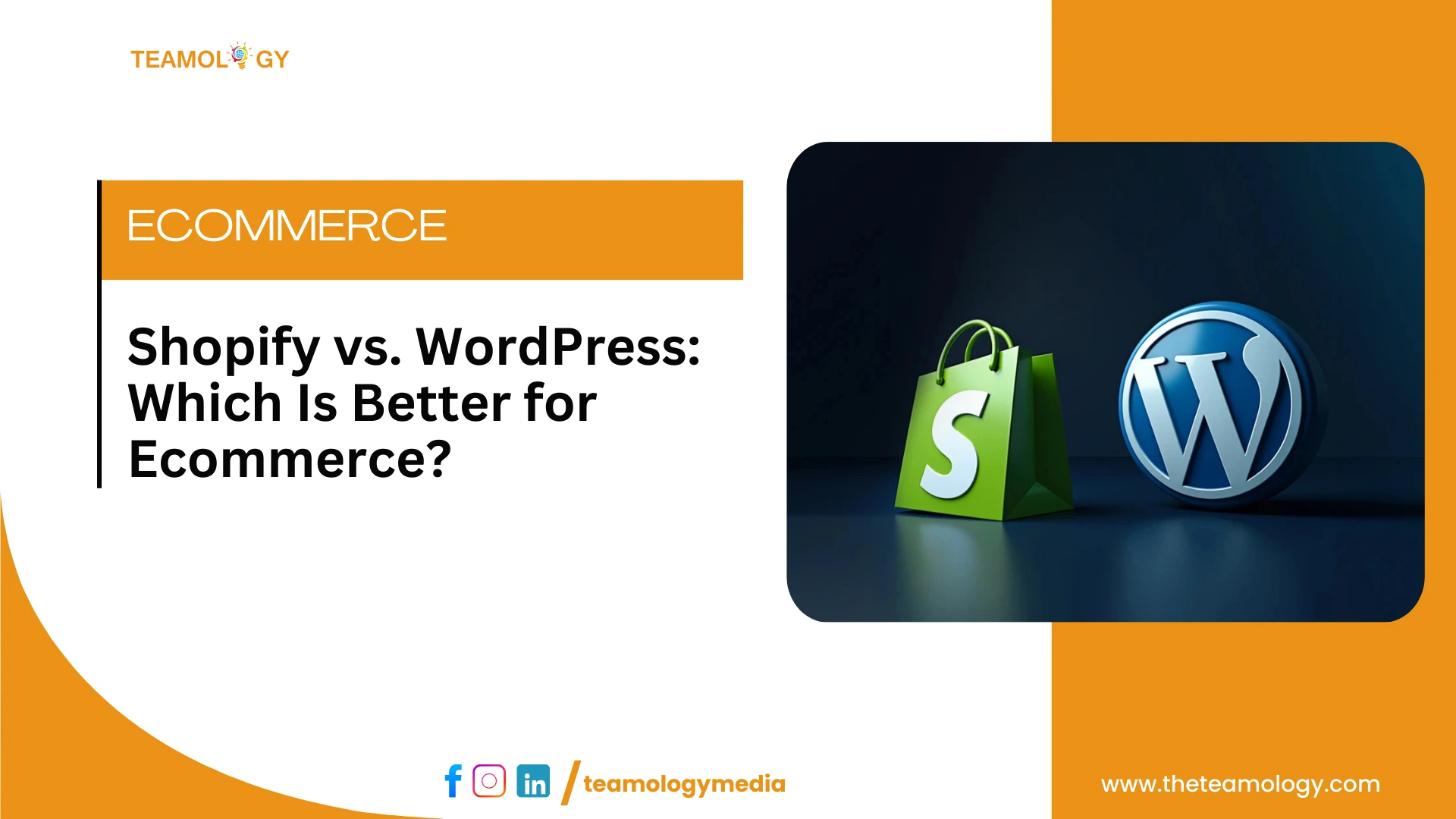Shopify vs WordPress for ecommerce – which one should you use to build your online store?
In this digital era, online businesses are growing at a rocket speed, and you must select an e-commerce site builder that can fulfill your needs.
Shopify is a comprehensive and managed e-commerce solution that helps businesses build fast, easy, and secure online stores. Conversely, WordPress, with the integration of WooCommerce, is famous for unlimited customizations, advanced SEO capabilities, and extensive control that can be fully customized according to your business needs.
In this blog, we will delve into the key differences between these two leading solutions for building online stores – Shopify vs WordPress for ecommerce – cost, features, SEO, mobile optimization, customer support, and more. Besides, you will learn factors like budget, technical skills, and how to scale – depending on which you will be able to decide the best platform for your business.
Platform Overviews
A. Shopify
Shopify is an all-encompassing, totally managed e-commerce platform that provides all the necessary tools and services required for building online shops, managing them, and boosting sales. The key value proposition of this platform is to provide a simple, secure, and scalable solution that helps you focus more on your business growth by freeing you from all the technical overheads.
Key Features:
Integrated Hosting: Shopify provides automated hosting services for your online shop, removing the headache of server-side management.
Built‑in Payment Options: It supports built-in payment gateways and mobile wallets like Google Pay, Apple Pay, and Shop Pay – ensuring fast and secure transactions.
Multi-channel Selling: Shopify offers integration with multi-channel sales, like Facebook, Instagram, and Amazon, so that you can easily sell your products across multiple digital channels.
Mobile Optimization: Its responsive theme and mobile-optimized checkout system guarantee a smooth shopping experience for customers on all mobile devices.
B. WordPress for E-commerce
WordPress is an open-source CMS or content management system providing powerful e-commerce solutions via the WooCommerce plugin. The platform’s key value proposition is to provide users the opportunity to fully control and customize their online stores, helping them to build and manage websites according to their needs. With WordPress, you can control every facet of your site on your own to boost your business growth.
Key Features:
High Customization & Flexibility: Self-hosted WordPress provides full control – themes, plugins, and custom coding can help you design your site structure for your brand.
Granular SEO Control: Using SEO plugins like Yoast or Rank Math, you can comprehensively customize your site’s URL, structure, meta tags, and schema markups.
Extensive Plugin Ecosystem: You can scale your site’s functionalities to e-commerce, inventory management, and transactions with the help of thousands of free and premium plugins.
Cost Flexibility: WordPress.org is free to use, however, you need to pay for hosting, domain, and premium themes/plugins – but again, the cost is flexible with your budget and requirements.
Comparison Criteria: Shopify Vs WordPress for Ecommerce
To help you decide on the Shopify vs WordPress ecommerce discussion, let’s compare them based on several key criteria:
A. Cost and Pricing
Shopify monthly subscription plans are divided into tiers:
Basic: Approx $29/month
Shopify: Approx $79/month
Advanced: Approx $299 monthly
Shopify Plus: Approx $2,300 monthly
This pricing includes hosting cost, cost of security, customer support, and all necessary e-commerce features. On the other hand, self-hosted WordPress offers free software, but you need to pay for:
Hosting: Shared or managed hosting at approx $3-$5/month
Domain Registration: Yearly $10 -$15
Premium Theme/Plugins: This can be a one-time or annual cost as per your needs.
Here, the main differentiator is the bundled pricing of Shopify against the a la carte pricing structure of WordPress.
B. E-commerce Features & Multi-Channel Selling
Shopify:
Out‑of‑the‑box E-commerce Tools: Shopify directly offers all the tools necessary for e-commerce, like inventory management, a built-in payment gateway, and channel integration.
Multi-Channel Integrations: Shopify easily manages sales on various digital selling channels like Instagram, Facebook, and Amazon, providing a seamless selling experience.
WordPress (WooCommerce):
Flexibility to Add Features: WooCommerce allows users to add features to their e-commerce sites using various plugins and custom integration.
Tailored Solutions: Through this, you can get more customized and specific solutions, however, it needs a few extra configurations and advanced technical skills.
C. SEO and Marketing Capabilities
A crucial aspect of any online business is SEO. Let’s see how Shopify vs WordPress for ecommerce stack up in terms of SEO and marketing capabilities.
Shopify:
Built‑in SEO Features: Shopify offers automated sitemaps, SSL certificates, and rapid hosting – essential for elementary SEO.
Limited Customization: Although basic features are available for SEO they might be limited for deeper customization.
WordPress:
Advanced SEO Options: You can gain intricate control over your URL, structure, meta tags, and schema markup using powerful SEO plugins like Yoast or Rank Math.
Granular Control: Using this you can customize your site’s SEO strategies more extensively – helpful in achieving lasting success.
D. Mobile Optimization
Shopify:
Responsive Themes: Shopify themes are by default responsive – providing an excellent shopping experience on mobile devices.
Mobile Wallet Integrations: Direct availability of mobile wallet integration like Apple Pay, Google Pay, and Shop Pay simplifies the process of mobile checkouts.
WordPress:
Theme Quality Dependent: WordPress mobile optimizations depend on theme quality and additional plugins.
Extra Configuration: You may have to use additional customizations or plugins to gain a mobile-friendly experience, even though you will have full control over their implementation.
E. Customer Support and Service
Shopify:
24/7 Support: Shopify’s customer support is available 24/7 via live chats, emails, and calls (for premium plans).
Unified Support Team: A centralized support team enables faster and more effective problem-solving.
WordPress:
WordPress.com: Support is available through email, live chat, and community forums for paid customers.
Self-hosted WordPress: Here, you need to use community forums, third-party agencies, or personal custom maintenance contracts in place of an official support team, which can be inconsistent or slow at times.
F. Customization and Flexibility
Shopify:
Ease-of-use: Shopify is super cool to use and manage, although there are some limitations in its design and functionalities.
Managed Environment: Everything is well-managed, so you don’t have enough opportunities to customize stuff.
WordPress:
Unlimited Customization: Self-hosted WordPress gives you endless opportunities to customize your site through themes, plugins, and custom coding.
Greater Technical Responsibility: However, you or your team need to possess advanced technical skills and perform regular maintenance – something that can lead to extra costs or time.
G. Security & Maintenance
Shopify:
Managed Security: Shopify automatically manages security measures like security updates, and SSL certificates, so no need to worry about technical security.
WordPress:
Manual Security Measures: If you are going for self-hosted WordPress you need to take care of security updates, backups, and other security measures on your own – that requires additional time and technical skills.
Use Cases & Target Audience: Shopify Vs WordPress for Ecommerce
To further clarify the Shopify vs WordPress for ecommerce decision, let’s examine which platform might be a better fit for different types of businesses.
A. Ideal for Beginners/Small Business Owners
Shopify:
For those new to business or running a small business and seeking an easy way to create their online stores, Shopify can be the best option. This is a one-stop platform where you will get every service starting from hosting and security to maintenance.
Therefore, you can put more focus on what you do best, which is business without having to poke your nose on those complex technical aspects. Shopify’s subscription model comes with predictable prices – which makes planning your budget so simple.
WordPress (WordPress.com Or Basic Self-hosted):
If you have budget constraints but possess good technical know-how, WordPress can be a great choice. WordPress.com allows you to create a website for free, while you need to subscribe to a paid plan to access a custom domain and advanced features.
If you can bear the extra costs for hosting and domain registration you will get more opportunities to customize your site on WordPress.org.
B. Ideal for Advanced Users/Brands
WordPress (With WooCommerce):
If you need deeper customization, advanced SEO, and optimum flexibility for your brand, WordPress’s WooCommerce plugin is a powerful solution. This will allow you to fully control every aspect of your e-commerce site, especially suitable for brands that need unique feature-rich designs.
But again, such a level of customization and management requires advanced technical skills and maintenance which again asks for extra time and money.
Shopify Plus:
For high-end sellers who want enterprise-grade features and dedicated support, Shopify Plus is an excellent alternative. It is designed for large-sized businesses and provides advanced customization, scalability, and a specialized support team.
If your business manages high traffic and sales, and if you are looking for a reliable, managed solution, you can give Shopify Plus a thought.
Conclusion: Shopify or WordPress for ecommerce
Shopify vs WordPress for ecommerce – an age-old battle, with each platform having its advantages and limitations. Shopify is a completely managed platform that is easy to use and has cohesive features, robust support, multi-channel selling options, and high-end mobile optimization. However, its pain points are high cost and limited customization.
In contrast, WordPress (WooCommerce) needs a smaller initial investment and offers high customization, powerful SEO plugins, and total control over your digital store. However, it requires higher technical proficiency and more time to operate, and also premium add-ons might cost extra.
Ready to transform your brick-and-mortar store online? Contact us for a free consultation session today to choose the right e-commerce platform for your business and set up an online store. Our expert team will be ready to give you the best solution according to your business needs. Come, let’s start the journey together to turn your dream e-commerce business into a reality.


